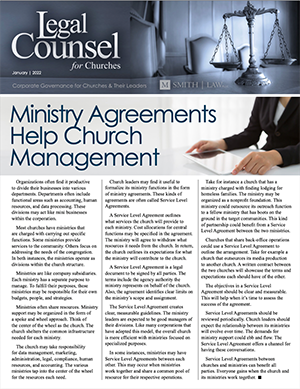One of the most important responsibilities of corporate leaders is strategic business planning. Strategy planning is the forward- looking exercise that defines where a business is going and how it plans to arrive. This is a governance issue as a matter of reasonableness.
Church directors and officers have a fiduciary duty of care in their capacities. This duty is measured by the reasonable person standard. Courts look to what a reasonable person would do under the circumstances. The reasonable person standard applies to all organizational leaders, regardless of company or industry. It is reasonable for leaders to lead. In other words, plan. This makes strategic planning a governance responsibility for church officials.
Looking from a non-spiritual perspective, the church is an organization with many of the same risks and opportunities as any company. The governing board of the church is charged with addressing these concerns. This is the function of strategic planning.
Strategic planning for a church should be tailored to the needs of its ministry. Each church faces individualized financial demands, operational risks, and market challenges. Church leaders should use their experience, knowledge, and insight to craft a strategic plan.
Strategy is an exercise that should always be on the agenda. Every church leadership meeting should include an agenda item for strategic planning. Here, leaders should pause to look ahead and consider what must be done today to reach an intentional future.
While routine strategy sessions can be helpful, there comes a time when church officials should remove themselves from the ordinary pace of business to focus just on strategy. This discussion often takes place during a strategic planning session.
Strategic planning sessions may be held off-site from the church to avoid distractions for the participants. Often, strategic planning sessions occur over a course of 2-3 days. Some organizations incorporate recreational or social time for bonding. This can not be overstated. Relationship building is a key factor for good governance.
Some churches find having a planning facilitator useful for their strategic sessions. The facilitator allows all church officials to step back and openly discuss the issues. The facilitator’s role is to keep everyone engaged, record progress and organize the discussions.
A good planning session facilitator will not take sides. The facilitator will be a neutral participant. He/she will help church leaders reach consensus on its direction. If a disagreement surfaces, the facilitator will act as a mediator to reach a settlement.
During the planning events, church leaders should seek to tackle big issues that can affect the future of the congregation. It is up to the church leaders to select subjects that are most relevant. The side panel list topics that may be useful for a strategy session.
The pandemic and recession have created uncertainties for churches. Navigating these times requires a board and management team that has the situational awareness and prowess to maneuver ahead. Church leaders should make planning a regular exercise.
Planning Session Topics:
- Information Security Threats
- Compensation Options for Employees
- The Future for Community Ministry
- The Local Economy in 2022 & Beyond
- Impact of the Pandemic on Ministry
- Accountable Ministry Culture
- Agile Business Practices
- Managing Projects and People
- How Innovation Fuels Results
- Rethink HR Practices & Styles
- Investment Strategies
- Managing a Ministry of Influence
- The Political Landscape
- Ethical Leadership
- Turning Uncertainty into an Asset
- Business Continuity in a New World
- Most Important Trends for Churches
- Establishing Strategic Planning Habits
- Leading Diverse Generations
- Payments and Financial Stewardship
- The Next Level in Digital Worship
- Talent for Tomorrow’s Ministry
- The New Era of Church Branches
- Future of the Workplace
- Financial Projections and Planning
- Pandemic Impact on Ministry

